条件句(虚拟语气)
条件句的虚拟语气
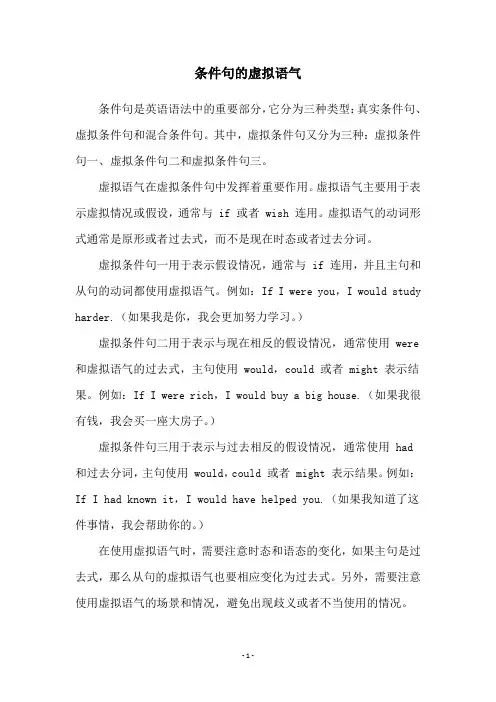
条件句的虚拟语气
条件句是英语语法中的重要部分,它分为三种类型:真实条件句、虚拟条件句和混合条件句。
其中,虚拟条件句又分为三种:虚拟条件句一、虚拟条件句二和虚拟条件句三。
虚拟语气在虚拟条件句中发挥着重要作用。
虚拟语气主要用于表示虚拟情况或假设,通常与 if 或者 wish 连用。
虚拟语气的动词形式通常是原形或者过去式,而不是现在时态或者过去分词。
虚拟条件句一用于表示假设情况,通常与 if 连用,并且主句和从句的动词都使用虚拟语气。
例如:If I were you,I would study harder.(如果我是你,我会更加努力学习。
)
虚拟条件句二用于表示与现在相反的假设情况,通常使用 were 和虚拟语气的过去式,主句使用 would,could 或者 might 表示结果。
例如:If I were rich,I would buy a big house.(如果我很有钱,我会买一座大房子。
)
虚拟条件句三用于表示与过去相反的假设情况,通常使用 had 和过去分词,主句使用 would,could 或者 might 表示结果。
例如:If I had known it,I would have helped you.(如果我知道了这件事情,我会帮助你的。
)
在使用虚拟语气时,需要注意时态和语态的变化,如果主句是过去式,那么从句的虚拟语气也要相应变化为过去式。
另外,需要注意使用虚拟语气的场景和情况,避免出现歧义或者不当使用的情况。
- 1 -。
【英语知识点】条件句和虚拟语气的区别
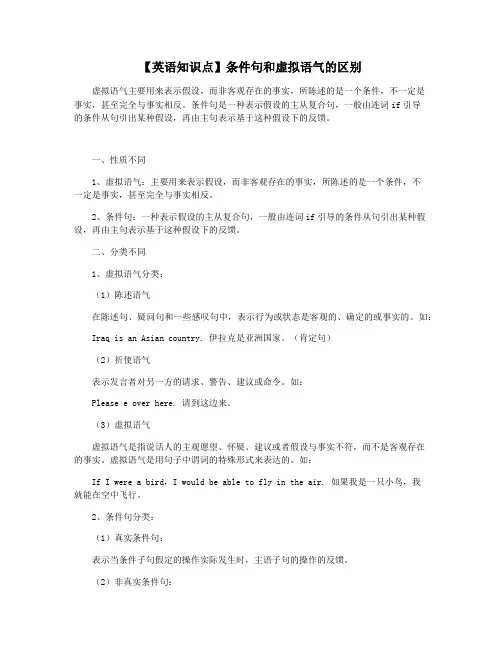
【英语知识点】条件句和虚拟语气的区别虚拟语气主要用来表示假设,而非客观存在的事实,所陈述的是一个条件,不一定是事实,甚至完全与事实相反。
条件句是一种表示假设的主从复合句,一般由连词if引导的条件从句引出某种假设,再由主句表示基于这种假设下的反馈。
一、性质不同1、虚拟语气:主要用来表示假设,而非客观存在的事实,所陈述的是一个条件,不一定是事实,甚至完全与事实相反。
2、条件句:一种表示假设的主从复合句,一般由连词if引导的条件从句引出某种假设,再由主句表示基于这种假设下的反馈。
二、分类不同1、虚拟语气分类:(1)陈述语气在陈述句、疑问句和一些感叹句中,表示行为或状态是客观的、确定的或事实的。
如:Iraq is an Asian country. 伊拉克是亚洲国家。
(肯定句)(2)祈使语气表示发言者对另一方的请求、警告、建议或命令。
如:Please e over here. 请到这边来。
(3)虚拟语气虚拟语气是指说话人的主观愿望、怀疑、建议或者假设与事实不符,而不是客观存在的事实。
虚拟语气是用句子中谓词的特殊形式来表达的。
如:If I were a bird,I would be able to fly in the air. 如果我是一只小鸟,我就能在空中飞行。
2、条件句分类:(1)真实条件句:表示当条件子句假定的操作实际发生时,主语子句的操作的反馈。
(2)非真实条件句:这意味着,当条件条款假定的行为不是客观发生的,而是主观虚构的,主句动作的反馈。
[所谓的与事实相反]。
感谢您的阅读,祝您生活愉快。
条件句中虚拟语气的用法和变化
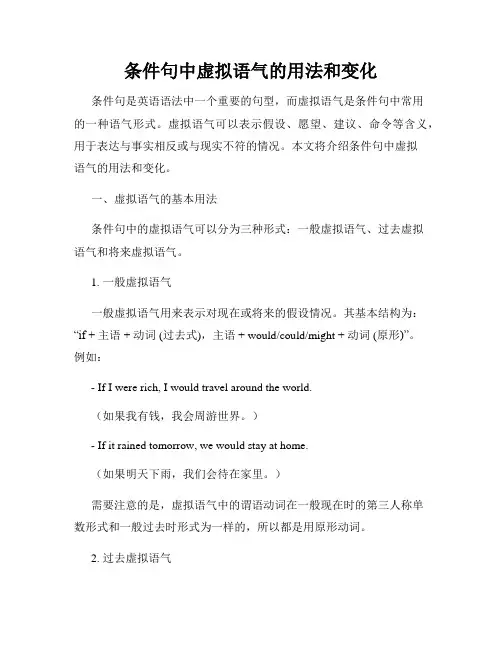
条件句中虚拟语气的用法和变化条件句是英语语法中一个重要的句型,而虚拟语气是条件句中常用的一种语气形式。
虚拟语气可以表示假设、愿望、建议、命令等含义,用于表达与事实相反或与现实不符的情况。
本文将介绍条件句中虚拟语气的用法和变化。
一、虚拟语气的基本用法条件句中的虚拟语气可以分为三种形式:一般虚拟语气、过去虚拟语气和将来虚拟语气。
1. 一般虚拟语气一般虚拟语气用来表示对现在或将来的假设情况。
其基本结构为:“if + 主语 + 动词 (过去式),主语 + would/could/might + 动词 (原形)”。
例如:- If I were rich, I would travel around the world.(如果我有钱,我会周游世界。
)- If it rained tomorrow, we would stay at home.(如果明天下雨,我们会待在家里。
)需要注意的是,虚拟语气中的谓语动词在一般现在时的第三人称单数形式和一般过去时形式为一样的,所以都是用原形动词。
2. 过去虚拟语气过去虚拟语气用来表示对过去的假设情况。
其基本结构为:“if + 主语 + had + 过去分词,主语 + would/could/might + have + 过去分词”。
例如:- If I had studied harder, I would have passed the exam.(如果我学得更努力,我就会通过考试了。
)- If I had known it earlier, I would have told you.(如果我早知道这件事,我会告诉你的。
)过去虚拟语气中的动词形式有一定的变化,主要是在谓语动词前加上had,并且过去分词的形式不变。
3. 将来虚拟语气将来虚拟语气用来表示对将来的假设情况。
其基本结构为:“if + 主语 + should/were to + 动词原形,主语 + would/could/might + 动词原形”。
虚拟语气(整理版)
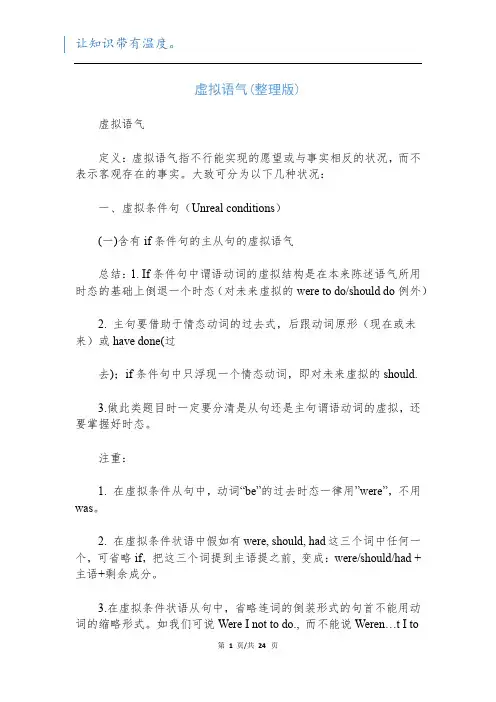
虚拟语气(整理版)虚拟语气定义:虚拟语气指不行能实现的愿望或与事实相反的状况,而不表示客观存在的事实。
大致可分为以下几种状况:一、虚拟条件句(Unreal conditions)(一)含有if条件句的主从句的虚拟语气总结:1. If条件句中谓语动词的虚拟结构是在本来陈述语气所用时态的基础上倒退一个时态(对未来虚拟的were to do/should do例外)2. 主句要借助于情态动词的过去式,后跟动词原形(现在或未来)或have done(过去);if条件句中只浮现一个情态动词,即对未来虚拟的should.3.做此类题目时一定要分清是从句还是主句谓语动词的虚拟,还要掌握好时态。
注重:1. 在虚拟条件从句中,动词“be”的过去时态一律用”were”,不用was。
2. 在虚拟条件状语中假如有were, should, had这三个词中任何一个,可省略if,把这三个词提到主语提之前, 变成:were/should/had +主语+剩余成分。
3.在虚拟条件状语从句中,省略连词的倒装形式的句首不能用动词的缩略形式。
如我们可说Were I not to do., 而不能说Weren…t I todo。
4.在表示与未来事实相反的条件句中,只能用should,而不能用would,could和might 等。
5.主句中的should通常用于第一人称,would,could以及might 可以用于各种人称(二)混合虚拟条件句当假设条件句的主句和从句不表达同一时光的时候,我们应使用混合时光的假设条件句,动词的形式要分离按照它所表示的不同时光做相应的调节,变法同if条件虚拟句的主从句谓语动词变法。
(三)含蓄条件句在含蓄条件句中,我们常使用otherwise ,or, but以及with ,without ,but for开头的介词短语来代替条件句。
注:1. but for =1)If it weren’t fo r(对普通现在时虚拟)2)If it hadn’t been for(对普通过去时虚拟)2.分句(直陈)+otherwise/or+分句→对主句谓语动词的虚拟3.分句(对主句谓语动词虚拟)+but/unfortunately+分句(直陈)4.with/without/but for+宾语+句子(对主句谓语动词虚拟)填空:1. 假如现在不下雨的话, 我们就出去野餐了。
条件句(虚拟语气)
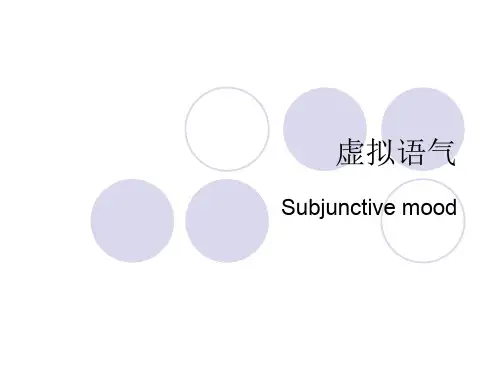
2. 与过去的事实相反(有时主句中的should have done表示责备或后悔)
2) ___ he would have come to class. [A]If Mike is able to finish his homework [B]Would Mike be able to finish his
eg: It is suggested that we (should) hold a meeting next week.
eg: It is necessary that he (should) come to our meeting tomorrow.
2)在宾语从句中的应用 在表示命令、建议、要求等一类动词后面的从句中。
should/would have + done (过去分词)
should/would + 动 词原形
a. 同现在事实相反的假设。
句型 :
条件从句
主句
一般过去时
should( would) +动词原
If they were here, they would help you.
b. 表示于过去事实相反的假设。
c. 表示对将来的假想
句型: 条件从句 一般过去时 were+ 不定式 should+ 动词原形
主句 should+ 动词原形 would + 动词原形
If you succeeded, everything would be all right.
If you should succeed, everything would be all right.
虚拟语气十大句型
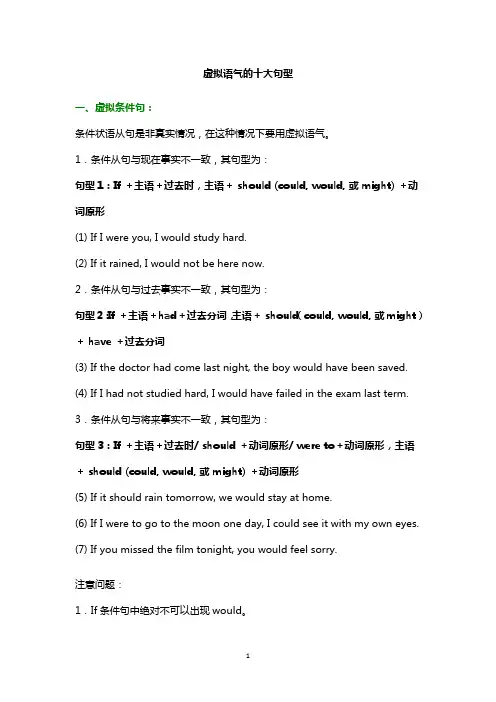
虚拟语气的十大句型一、虚拟条件句:条件状语从句是非真实情况,在这种情况下要用虚拟语气。
1.条件从句与现在事实不一致,其句型为:句型1:If +主语+过去时,主语+ should (could, would, 或might) +动词原形(1) If I were you, I would study hard.(2) If it rained, I would not be here now.2.条件从句与过去事实不一致,其句型为:句型2:If +主语+had+过去分词,主语+ should(could, would, 或might)+ have +过去分词(3) If the doctor had come last night, the boy would have been saved.(4) If I had not studied hard, I would have failed in the exam last term. 3.条件从句与将来事实不一致,其句型为:句型3:If +主语+过去时/ should +动词原形/ were to+动词原形,主语+ should (could, would, 或might) +动词原形(5) If it should rain tomorrow, we would stay at home.(6) If I were to go to the moon one day, I could see it with my own eyes.(7) If you missed the film tonight, you would feel sorry.注意问题:1.If条件句中绝对不可以出现would。
2.根据句中的时间状语,有时可能出现“混合虚拟”的情况,即主句可能是现在的情况,条件句也许是发生在过去的情况,但都要遵守上述句型。
如:(8) If you had studied hard before, you would be a college student now and you would graduate from a college in four years’ time.3.条件句中如果出现were, had, should可省去if,将主语与这些词倒装。
什么是虚拟语气的条件句
什么是虚拟语气的条件句?虚拟语气(Subjunctive Mood)是英语中一种特殊的语气形式,用于表示假设、愿望、建议、命令等非真实的情况。
虚拟语气在条件句(Conditional Sentences)中经常使用,以表达某种条件下可能发生的情况。
条件句分为三种类型:真实条件句(Real Conditional Sentences)、虚拟条件句(Unreal Conditional Sentences)和混合条件句(Mixed Conditional Sentences)。
在虚拟条件句中,常常使用虚拟语气来表示与事实相反的情况。
虚拟条件句分为两个部分:条件部分和结果部分。
条件部分陈述了一个假设或条件,而结果部分陈述了与该条件相关的可能结果。
以下是虚拟条件句的几个例子:1. 如果我有时间,我会去旅行。
(真实条件句)If I have time, I will travel.2. 如果我有时间,我会去旅行。
(虚拟条件句)If I had time, I would travel.3. 如果我有时间,我会去旅行。
(混合条件句)If I had time, I would have traveled.在虚拟条件句中,条件部分使用虚拟语气来表示与事实相反、或者是不可能实现的情况。
通常在条件部分使用过去时的形式,例如使用过去完成时或过去简单时。
结果部分则根据条件部分的虚拟语气形式进行相应的变化,使用would + 动词原形来表示结果。
需要注意的是,虚拟条件句中的动词形式取决于条件的类型和时间。
例如,对于与现在事实相反的情况,条件部分使用过去时,结果部分使用would + 动词原形。
对于与过去事实相反的情况,条件部分使用过去完成时,结果部分使用would + have + 过去分词。
对于与将来事实相反的情况,条件部分使用过去时,结果部分使用would + 动词原形。
总之,虚拟语气在条件句中用于表示与事实相反或不可能实现的情况。
虚拟语气分三种情况来掌握
虚拟语气分三种情况来掌握:1、虚拟条件句。
2、名词性虚拟语气。
3、虚拟语气的其他用语。
一、虚拟条件句:条件状语从句是非真实情况,在这种情况下要用虚拟语气。
1、条件从句与现在事实不一致,其句型为:If 主语+过去时,主语+should(could, would,或might)+动词原形,如:If I were you, I wouldstudyhard.If it rained, I wouldnot be here now.2、条件从句与过去事实不一致,句型为:If 主语+had+过去分词,主语+should(could, would,或might)+have+过去分词,如:If the doctor had come last night, the boy wouldhave saved.If I had not studie d hard, I wouldhave failed in the exam last term.3、条件从句与将来事实不一致,句型为:+do,主语+should(could…)+原形do过去时(与现在事实条件句一样)。
If it should rain tomorr ow, we wouldstay at home.If I were to go to the moon one day, I couldsee it with my own eyes.If you missed the film to night, you wouldfeel sorry.注意问题:1、If条件句中绝对不可出现“would”。
2、根据句中的时间状语,有时可能出现“混合虚拟”的情况,即主句可能是现在的情况,条件句也许是发生在过去的情况,但都是遵守上述句型。
3、在条件句中如果出现we re, had, should可省去if,将主语与这些词倒装,例如:Had the doctor come last night, the boy wouldhave saved.Were I to go to the moon one day, I wouldsee it with my own eyes.Should it rain tomorr ow, we wouldstay at home.二、名词性虚拟语气:在表示命令、建议要求、惊叹时的名词性从句中需用虚拟语气,基本句型:主语+(should)+动词原形,如:Mother insist ed that John go to bed at 9 o’clock.(宾语从句)We sugges ted that the meetin g should not be held.It was requir ed that the cropsshould be harves ted at once.(主语从句)The sugges tionthat he be invite d was reject ed.(同位语从句)That is theirdemand that theirwagesbe increa sed.(表语从句)注意:在这种句子中绝不出现“would”“must”“could”等。
深入解析语法中的虚拟语气与条件句
深入解析语法中的虚拟语气与条件句虚拟语气与条件句是语法学中常见的两个概念,它们在句子中扮演着重要的角色。
通过深入解析这两个概念,我们可以更好地理解语法规则和句子结构。
本文将详细介绍虚拟语气和条件句的基本概念、用法和常见的分类。
同时,我们还将提供一些实例来帮助读者更好地理解和应用这些语法知识。
一、虚拟语气的基本概念虚拟语气是指句子中表达的是一种假设、愿望、建议、命令、推测、条件或不可能实现的情况。
它与现实情况相对,是一种虚构或假设的语气。
虚拟语气通常包括条件句、愿望句、建议句、命令句和推测句等。
1. 条件句:条件句是虚拟语气的一种常见形式,它表达的是一种假设或条件。
条件句分为三种类型:与事实相反的虚拟条件句、与现在事实相反的虚拟条件句和与过去事实相反的虚拟条件句。
与事实相反的虚拟条件句用于表达与现实情况相反的假设或条件。
常见的引导词包括"if"、"unless"和"were to"等。
例如:"If I were rich, I would travel around the world."(如果我富有,我会周游世界。
)与现在事实相反的虚拟条件句用于表达与现实情况相反的假设或条件,通常与现在事实相反的情况相关。
常见的引导词包括"if only"、"I wish"和"suppose"等。
例如:"If only I had studied harder, I would have passed the exam."(要是我当时更用功一些,我就能过这次考试了。
)与过去事实相反的虚拟条件句用于表达与过去事实相反的假设或条件,通常与过去事实相反的情况相关。
常见的引导词包括"if"、"suppose"和"had it not been for"等。
条件状语从句之虚拟语气
条件状语从句之一:虚拟语气条件句可分为两类,一类为真实条件句,一类为[1]非真实条件句。
非真实条件句表示的是假设或实际可能性不大的情况,故采用虚拟语气。
英语:If he doesn't hurry up,he will miss the bus.如果他不快点,他将错过巴士。
( 真实)If he is free,he will ask me to tell stories.如果他是空闲的,他会要求我讲故事。
(真实)If I were you,I would go at once.如果我是你,我马上就会去。
(我不可能是你。
非真实,虚拟语气)If there were no air,people would die.如果没有空气,人就会死亡。
(不可能没有空气。
非真实,虚拟语气)用法及动词形式1、表示与现在事实相反的情况:从句:If 主语+过去时(Be动词用were)主句:主语+should/would/could/might+doeg:1.If I were you,I would take an umbrella.如果我是你,我会带把伞。
(事实:我不可能是你)2.If I knew his telephone number,I would tell you.如果我知道他的电话号码,我就会告诉你。
(事实:不知道)3.If there were no air or water,there would be no living things on the earth.如果没有水和空气,地球上就不会有生物。
(事实:地球上既有空气也有水)4.If I had any money with me,I could lend you some.如果我带钱了,我就会借给你些。
(事实:没有带钱)5.If he studied harder,he might pass the exam.如果他再努力些,就能通过考试了。
- 1、下载文档前请自行甄别文档内容的完整性,平台不提供额外的编辑、内容补充、找答案等附加服务。
- 2、"仅部分预览"的文档,不可在线预览部分如存在完整性等问题,可反馈申请退款(可完整预览的文档不适用该条件!)。
- 3、如文档侵犯您的权益,请联系客服反馈,我们会尽快为您处理(人工客服工作时间:9:00-18:30)。
If the United States had built more homes for poor people in 1955,the housing problems now in some parts of this country ___ so serious.
[A] wouldn’t be [B] will not have been [C] wouldn’t have been [D] would have not been
homework [C] If Mike could finish his homewor [D] If Mike had been able to finish his
homework
3) If the United States had not entered the Second World War,probably the 1940 unemployment rate of 14% ___still further.
注意: 如suggest, insist不表示"建议" 或"坚持要 某人做某事时",即它们用于其本意"暗示、表明"、 "坚持认为"时,宾语从句用陈述语气。 The guard at gate insisted that everybody obey the rules.
eg: It is suggested that we (should) hold a meeting next week.
eg: It is necessary that he (should) come to our meeting tomorrow.
2)在宾语从句中的应用 在表示命令、建议、要求等一类动词后面的从句中。
[A] If he has listened to me [B] Had he listened to me [C] If he listened to me [D] As soon as he listened to me
特殊的虚拟语气词:should
1) It is demanded / necessary / a pity + that…结构中的主语从句的谓语动词要用 should 加动词原形, should 可省略。
almost all of the world’s supply.
diamonds would have not
3. 与将来的事实相反
5) It is said Tom will go to an appointment tommorrow. If he were to come tomorrow, I ___ ask him to go to your place.
虚拟语气
Subjunctive mood
真实条件句
真实条件句用于陈述语气,假设的情况可 能发生,其中 if 是如果的意思。
时态关系
句型: 条件从句
主句
一般现在时 shall/will + 动词原形
If he comes, he will bring his violin.
真实条件句
典型例题 The volleyball match will be put off if it ___.
If you were to succeed, everything would be all right.
1. 与现在的事实相反
1) What type of automobile would you buy ___ ? [A] if you have free choice to choose the cars
should/would have + done (过去分词)
should/would + 动 词原形
a. 同现在事实相反的假设。
句型 :
条件从句
主句
一般过去时
should( would) +动词原
If they were here, they would help you.
b. 表示于过去事实相反假设。
If I were you, I would go to look for him. 如果我是你,就会去找他。
If he were here, everything would be all
right. 如果他在这儿,一切都会好的。
典型例题 _____ to do the work, I should do it some
shall (will) +动词原形,而直接用一般现在 时的动词形式。
非真实条件句
时态:可以表示过去,现在和将来的情况。它的 基本特点是时态退后。
条件从句
主句
同现在事实相反 同过去事实相反 同将来事实相反
一般过去时
过去完成时
一般过去时 were + 不定式 should + 动词原形
should/would + 动 词原形
A. will rain B. rains C. rained D. is rained
注意: 1) 在真实条件句中,主句不能用be going to表示将来,该用shall, will.
If you leave now, you are never going to
regret it.
If you leave now, you will never regret it. 2) 表示真理时,主句谓语动词便不用
句型:
条件从句 过去完成时
主句 should(would) have+ 过去分
If she had worked harder, she would have
succeeded.
The rice would not have been burnt if you had
been more careful.
If my lawyer had been here last Saturday, he
would have prevented me from going.
If he had come yesterday, I should / would have told him about it.
虚拟条件句的倒装
虚拟条件句的从句部分如果含有were, should, 或 had, 可将if省略,再把were, should或had 移到从 句句首,实行倒装。
If they were here now, they could help us. =Were they here now, they could help us. Had you come earlier, you would have met him. =If you had come earlier, you would have met
含义:He did not come yesterday, so I did not tell him about it.
If he had not been ill and missed many classes, he would have made greater progress.
含义: He was ill and missed many lessons, so he did not make greater progress.
[A] would rise
[B] would risen
[C] would have risen
[D] had risen
4) Top grade [A] diamonds had not [B] increased so sharply [C] in value in the late seventies [D] if one company had not controlled
If you had asked him yesterday, you would know what to do now. (从句与过去事实相反,主句与现在事实相反。)
If it had rained last night (过去), it would be very cold today (现在).
cars available today
2. 与过去的事实相反(有时主句中的should have done表示责备或后悔)
2) ___ he would have come to class. [A]If Mike is able to finish his homework [B]Would Mike be able to finish his
order, suggest, propose, require, demand, request, insist, command, insist + (should) do eg: I suggest that we (should) hold a meeting next week.
He insisted that he (should ) be sent there.
c. 表示对将来的假想
句型: 条件从句 一般过去时 were+ 不定式 should+ 动词原形
主句 should+ 动词原形 would + 动词原形
If you succeeded, everything would be all right.
If you should succeed, everything would be all right.
him. Should it rain, the crops would be saved =If it should rain, the crops would be saved.
